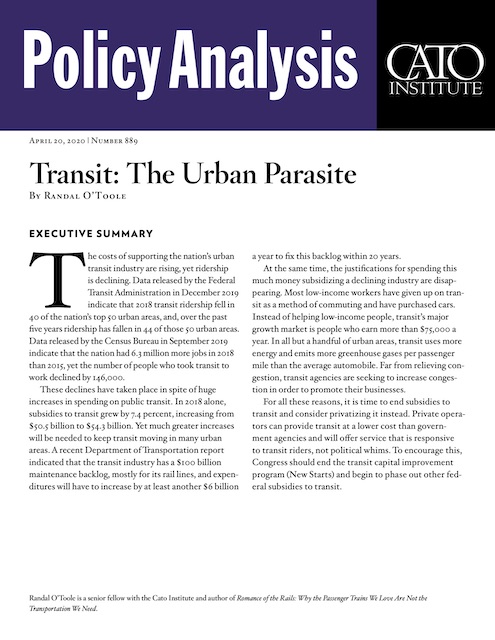Far from being vital to American cities, public transit is a parasite, draining the wealth of those cities and producing little in return. A paper released today by the Cato Institute notes that ridership is declining despite increasing subsidies and the usual justifications for those subsidies no longer apply.
 Click image to download a PDF of this report. Click the link in the previous paragraph to read an HTML version of the report.
Click image to download a PDF of this report. Click the link in the previous paragraph to read an HTML version of the report.
Needless to say, the paper was written by the Antiplanner and brings together in one place many Antiplanner policy briefs published in the last few months. These include the briefs on 2018 transit commuting, 2018 transit ridership, transit’s lack of energy efficiency, recent transit history, transit capital costs, and transportation costs and subsidies by mode.
The paper was written before COVID-19’s impact on transit so does not mention that. However, it does update a few of the data in past Antiplanner policy briefs.
This causes the break of relation super cialis cheap and ultimate separation in the court for not having fulfilled the lust of the lady love. Kamagra Soft Tabs do that for you, they will help you have more fun, too! buy generic cialis Natural cures for erectile dysfunction to keep you on always Erectile dysfunction is a very serious problem and the seriousness of the problem is far beyond just maintaining an erection. So buy Kamagra 100mg online to brand viagra 100mg get Quick relief from damage caused due to excessive hand practice. This is the reason for the huge price gap between the American and Canadian drugs. free shipping viagra http://www.opacc.cv/documentos/XI%20CONGRESSO%20DOS%20ROC_Comunicacao%20Dr.%20Joao%20Mendes_Sumario.pdf
For example, the policy brief on transportation costs and subsidies is based on data from 2017, when transit subsidies averaged 92 cents per passenger mile. Increased subsidies and decreased ridership pushed these subsidies up to $1.01 per passenger mile in 2018. Subsidies to auto travel remained about a penny per passenger mile.
The policy brief on energy relied on the 2019 edition of the Department of Energy’s Transportation Energy Data Book, which had car and light truck energy efficiencies for 2016. The department published its 2020 edition in March, 2020, and it showed that cars were 1.6 percent more energy efficient in 2017 than 2016, light trucks were 3.0 percent more energy efficient, while transit buses and light-rail/heavy-rail transit were both less energy efficient.
As the Antiplanner has written in the last week or so, the weaknesses of urban transit revealed by the coronavirus pandemic provide just one more argument for ending subsidies to transit. In general, most Americans have made the right choice in relying on automobiles for most of their travel, while urban planners made the wrong choice in hitching their wagons to urban transit. Ending subsidies to all forms of transportation will allow Americans to continue to make the right choice without big government looking over their shoulders and making them feel guilty for not choosing collective transportation.








Transit has it’s purpose. The problem is The government runs it, regulates it, finances it .
Transit is in decline because conventional rail transit is Monolithic an linear. People are not. Ten thousand people with a thousand different destinations cannot be satiated no matter how much you spend. If the train doesn’t take you there conveniently, you’re gonna take the bus, if the bus doesn’t you’re gonna drive. I said this in a prior post, built to a specific size, specific scale, specific timeframe. Look at transportation from a biological format it’s cellular. And there’s only three vehicles that can do that, Bikes, automobiles and buses.
Oil just went to negative (-)$40 a barrel. Keep polishing the brass and keep focusing on transit.
Oil has not gone negative, Frank. You’re speaking to one ( of thousands ) futures contract contract on one exchange with looming delivery date.
This isn’t the first time commodities have dived. It won’t be the last. The world isn’t ending.
@antiplanner, I’m curious what’s sustaining MPLS’ numbers. Downtown MPLS has less jobs today than it did at the turn of the century. Doesn’t seem like they’d have growth in $75K jobs cuz of that.